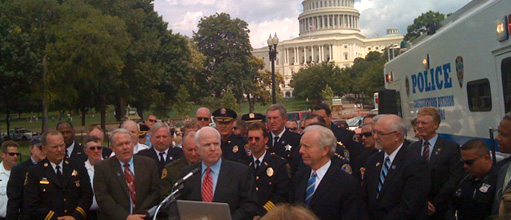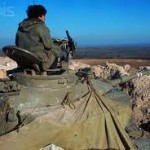What better speech to feature on this Veteran’s Day than this one by John McCain, an outstanding veteran himself as are other members of his family. He speaks about military leadership qualities and veterans that exemplify these talents that have guided the United States to world prominence. Cpt. Otis
Subject: Sen. McCain’s Speech at Tailhook 2011
JOHN McCAIN AT THE TAILHOOK SYMPOSIUM HONORING THE CENTENNIAL OF NAVAL AVIATION
September 12, 2011
“Thank you, Rabbit, for that very kind introduction. There are many people here tonight who rank among the true heroes of Naval Aviation, including George Walsh, Tom Hudner and ADM Tom Heyward.
“I thank you for your service to our country and your leadership in this wonderful profession we all cherish.
“On behalf of all the McCains who have served in Naval Aviation – from my grandfather who earned his wings as a Captain in 1936; my oldest son, Doug, who earned his wings in 1985; to my son, Ltjg Jack McCain, who earned his wings this past January – I thank you for the very generous recognition you have given my family. It has been a privilege for all of us to serve and to have played a small part in the first 100 years of Naval Aviation history.
“Ever since reporting to Pensacola more than 50 years ago, I have had the pleasure of being involved with Naval Aviation in some capacity. I acknowledge that my early involvement was at times ‘eventful’ – and that my mishap record certainly contributed to the national debt. I doubt that I would last very long in today’s Navy.
“One of the benefits of living as long as I have, is that you get to see a lot of history in the making. And if you are paying attention, you can learn the lessons of what we did right, and what we did wrong. Both should be carefully studied. At the very least, we should make it our goal to repeat what worked well – and to avoid what didn’t.
“Tonight I would like to talk briefly about what I believe to be the key factor in the success of Naval Aviation over the past century. It is one of the things we did right. It has to do with leadership.
“Although we just celebrated the 69th anniversary of the Battle of Midway, I want to return to that battle to make a fundamental point. At Midway, barely six months after the attack on Pearl Harbor, we faced an enemy supremely confident in their ability – not just to defeat, but to annihilate – the battered remnants of Halsey’s Pacific Fleet. We were overwhelmingly outnumbered and outgunned. The Japanese brought 8 carriers, we had barely three; they had 11 battleships, we had none. And the Japanese had the best fighter aircraft in the Pacific – the Mitsubishi Zero – that easily dominated the slower, less agile TBDs, SBDs, F4Fs, and Marine F2As.
“Making matters worse, our forces were plagued by faulty equipment. The Mk 13 torpedo was notoriously unreliable. In fact, not a single torpedo dropped at Midway by Torpedo 3, Torpedo 6 or Torpedo 8 even detonated. And the new electrical arming system on the SBD’s had the annoying habit of randomly releasing the bomb when the Master Arm switch was selected.
“But in the end, the battle turned not on numbers or equipment – but rather on the actions – and the leadership – of some truly extraordinary men. What they did at Midway has become the stuff of legend.
“Men like LCDR John Waldron, skipper of Torpedo 8, who led his 15 TBD Devastators against one of the enemy carriers at wave-top height and barely 100 knots, while trying to fend off the far more capable – and deadlier – Zeros. With no fighter cover of his own, Waldron’s fate was sealed. His last transmission to his squadron- mates was simple: ‘We will go in. We won’t turn back. We will attack. Good luck.’
“And men like Marine Major ‘Joe’ Henderson, who led his mixed squadron of F4Fs and F2As against the carrier Hiryu. Struck by anti-aircraft fire, his aircraft in flames, Henderson pressed the attack – on what would be his last flight.
“And LCDR Wade McClusky, who, despite being dangerously low on fuel, kept searching for the Japanese carriers until he found them, and whose extraordinary leadership – according to Admiral Nimitz – ‘decided the fate of our carrier task force and our forces at Midway.’
“My friends, the Battle of Midway was won not by superior equipment, and certainly not because we outnumbered the Japanese. We won because of the stout hearts and uncommon leadership that for one hundred years has been the hallmark of Naval Aviation.
“My grandfather, who commanded a carrier task force in the Pacific during WWII, lived large and was always larger than life to me. He rolled his own cigarettes, smoked constantly, swore and drank more than he should have. He was known as one of the Navy’s best cussers, probably not the sort of recognition one would want today. ‘Slew’ was his call sign. James Michener described him in Tales of the South Pacific as ‘an ugly old aviator’ but he was more than that, especially to his men. He was revered for his gregarious, salty attitude, and for his keen interest in his sailors and their thoughts on just about any subject. He made it a point to talk with pilots after they returned from a strike, asking them, ‘Do you think we’re doing the right thing?’ Here was a 3-star admiral, taking time during the course of war to receive honest feedback from men under his command. My grandfather knew that if you ever stopped learning, especially from your men, then you also stopped leading. And he knew how to lead.
“Today, we hear a lot about ‘management’ and not enough about leadership. That worries me. One thing of which I am certain – there is a great difference between managers and leaders. Good managers are plentiful – in fact, our nation graduates over 150,000 MBAs ever year. But true leaders are rare. And believe me, there is a difference.
–Leaders inspire people; managers, well, they “manage” people and assets.
–Leaders think about protecting and promoting their people; managers think about protecting their own careers.
–Leaders take charge and accept responsibility; managers often pass the buck to higher authority for fear of making a wrong decision.
–Leaders take risks when necessary; managers are taught to avoid risks whenever possible.
“Ronald Reagan was a leader – Jimmy Carter was a manager. Halsey, Nimitz, and Spruance were leaders. Henderson, McClusky, and Waldron were leaders. If any one of them had opted for caution rather than courage when their moment of testing came, the outcome at Midway would have been radically different.
“My father – who was not an aviator but knew something about leadership – used to say that technical experts are a ‘dime a dozen’. You can always find a man who can tell you how many foot-pounds of force are in a piston, or what the aerodynamic effects on a plane will be at a certain airspeed and altitude. But, he said, ‘The business of leadership is another matter entirely. It’s one of the most difficult subjects there is – to inspire in people subordinate to you, the desire to do a better job.’ That is where true leadership trumps management – in the art of inspiring others to perform far beyond their self-imposed limits.
“In recent years, I have often wondered if we have forgotten some of the more salient lessons of history, particularly as they apply to the development and selection of our military leaders. Have we allowed ourselves to be knocked off course to the point that we strive now to produce the ‘ideal manager’ rather than the next generation of true leaders? Have we focused too much on the strategy and tactics of the battle – and not enough on the leadership skills of those who really decided the outcome, not just at Midway, but at countless other critical battles throughout the past century?
“I am at heart, and always will be, a Naval Aviator. It was my first profession and will always be my favorite. And just in case there is someone here tonight who does not understand why I place so much emphasis on leadership over management, let me be clear. The very nature of our profession demands it. No manager, however competent, will ever be able to inspire people to endure the hardships and make the sacrifices that we all know must come with Naval Aviation. Enduring those hardships and making those sacrifices is the price we pay for the privilege of defending our great nation.
“So as we celebrate the centennial of Naval Aviation and begin to contemplate the next 100 years, I encourage all of you to look back on those who led us through our first century. I urge you to study their lives and their leadership styles. Then strive to be like them. Learn to inspire the men and women who work for you. Learn to lift them up, to give them meaningful responsibility, to allow them room to grow, and yes, even to make mistakes. Be slow to judge, and remember that many of our most gifted leaders would never have survived in a ‘one strike’ or ‘zero defect’ environment. If instead, your style is to be quick to criticize, slow to praise, and you are unwilling to forgive, I urge you to seek a different profession. And if you have not yet learned the power of redemption, I encourage you to read the biographies of Nimitz, Halsey, Boyington, Henderson, McClusky, and Waldron – just to name a few.
“Now as I look around the audience – at some of the younger faces – I see another reason why I love Naval Aviation. I can imagine myself, 50 years ago, sitting in this audience, with a wide grin on my face, because I knew I was very lucky to be in this position. I envy you, with your ability to do the same things I did, only better. I can’t turn back the clock, but I can live a little vicariously through you. Make us proud. Make us better. Our future belongs to you now. Make the next 100 years of Naval Aviation something old ‘Slew’ and John Waldron and Wade McClusky would be proud of.
“Thank you and God Bless.”
Loyal Subscribers! We need some help. The purpose of our “Heart” section is to publish stories of the experiences, contributions and sacrifices of our military (Army, Navy, Air Force, Marines and Coast Guard) and public service personnel (police officers, fire fighters, EMS, merchant marines and others in the public sector) as well as stories of their families. Please search your memory and computer for a few and send them to Bill (CPT Otis) O’Quin at boquin@ix.netcom.com for possible publication. Thanks!
Important links for updated military/defense information:
The Daily News Briefing: Today’s News for the U.S. Military, their families and friends.
The Military Trivia Challenge: Register and test your knowledge about military history.
U.S. Department of Defense: Military Defense News.


